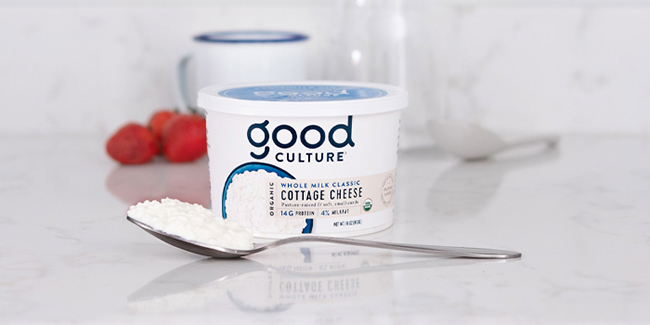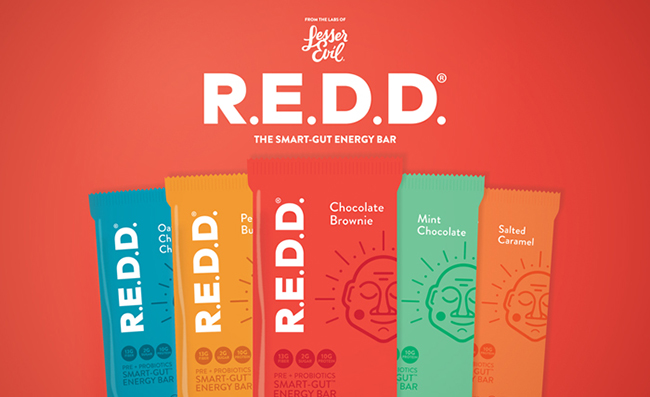NOSHscape: The Latest Food Brand News

Good Culture Closes $64M Round, Targets $100M in Sales
Dairy brand Good Culture has taken another step towards its goal of becoming a cultured foods platform, announcing in February the closing of a $64 million funding round that will support retail and product expansion this year.
The raise was led by Manna Tree, with participation from SEMCAP Food & Nutrition and actor Kristen Bell, who Merrill said invested at the same valuation as Manna Tree and SEMCAP. Some of the capital will be used to provide liquidity to early investors including CAVU Venture Partners and General Mills’ investment arm 301 Inc, which both previously took part in the company’s $2.1 million round in 2016 and $8 million round in 2019.
“We’re definitely at an inflection point. And we think this investment is necessary to support that rapid growth and continued momentum,” said CEO and founder Jesse Merrill. “[Manna Tree has] overlapping values and we are both committed to creating real food system change. We’re really looking to [them] to be thought partners who will help us shape and sharpen our vision across all parts of the business.”
As a result of the deal, SEMCAP managing partner John Haugen will regain the board seat he previously held while at 301 Inc. The brand declined to comment on how much it has raised in total to-date.
Good Culture’s portfolio of organic cottage cheese, low sugar fruit topped cottage cheese, sour cream, lactose-free sour cream and cottage cheese is sold in over 10,000 doors. The company has a compound annual growth rate (CAGR) of 79% for the past five years with $70 million in retail sales for the last 52 weeks, Merrill said, and a plan to achieve $100 million in sales for fiscal year 2022.
The capital will go towards marketing efforts, focusing on building “top of the funnel awareness,” in addition to performance marketing in-store. Though Good Culture initially launched in the natural channel, it has since expanded into conventional grocery, with MULO (where Merrill says it’s the top selling natural cottage cheese brand) now accounting for 64% of sales.
Though shoppers, particularly in conventional retailers, may see cottage cheese as a “diet food,” he said, these marketing efforts can help change that narrative to see it as a “nutrient dense, superfood…with healing properties.”
“This will allow us to just more effectively tell our story in a larger way to a larger audience,” Merrill said. “If we’re serious about getting to the top of the mountain and getting to the next level of growth, we want to ensure that we have the war chest to enable that growth.”
Direct-to-consumer sales, however, do not appear to be part of those plans. After testing the channel last year, Merrill said the brand changed course due to the high cost of shipping a relatively heavy, perishable product. Instead it will focus on growing its sales via shopping platforms such as Instacart, Amazon Fresh and Shipt.
The funding will also allow Good Culture to launch new products, Merrill said, ultimately creating a platform of cultured food products that support microbiome diversity.
In the near term, the focus is squarely on the dairy case, with its most recent expansion lactose-free sour cream and cottage cheese. Yet Merrill said he could see other refrigerated fermented foods outside of the dairy set offering the brand room for expansion. Still, demand for the line has already stretched the company’s existing supply chain, he added, so investment will first go towards building more capacity with existing co-manufacturers.
Good Culture is a Certified B-Corp with a partnership with 1% for the Planet, and is also working with dairy co-op Dairy Farmers of America (DFA) to transition more conventional farms over to ones that embrace regenerative agriculture practices. While the capital won’t directly go to those efforts, Merrill said, as Good Culture scales it will be able to encourage more farmers to make the swap and “accelerate that mission.”
“We’re effectively changing the food system and creating a new milk supply to allow us to have access to pasture raised milk for all of our products. As we’ve grown, it’s proven to be quite challenging,” he said. “We’re creating change every day.”
LesserEvil Acquires R.E.D.D. Bar
In March, organic snack brand LesserEvil announced it will spearhead a coalition of brands trying to clean up the types of oil used in packaged food products. The company also announced its first acquisition, protein bar brand R.E.D.D. BarTerms of the deal were not disclosed.
LesserEvil CEO and president Charles Coristine said the acquisition will accelerate his company’s long-held plans to break into the bar category.
“We already make a variety of snacks, including cookies, so bars felt like a nice transition,” Coristine said. “Like LesserEvil, R.E.D.D. prioritizes quality ingredients in its bars, which aligns with LesserEvil’s mission and ethos to create clean, healthy snacks that are as tasty as they are better for you.”
Founded by former male model Alden Blease in 2010, R.E.D.D. markets a five-SKU line of plant-protein based bars. Two years ago the company launched R.E.D.D. Labs, a D2C platform designed to help the company test new innovations, including a line of plant-based protein powders.
According to SEC filings, the Portland, Maine-based brand has raised roughly $4.5 million since its inception.
LesserEvil is manufactured in Connecticut and will take over R.E.D.D.‘s production in May, Coristine told NOSH. The company plans to evolve the line’s taste, ingredient deck and texture, and highlight LesserEvil’s signature branding icons, such as its gurus, on the packaging. The R.E.D.D. team will also be integrated into the LesserEvil family, he said.
“R.E.D.D. brings the know-how of creating a great bar and strong relationships in the category and at LesserEvil, we have the knowledge of production and operations,” Coristine said. “The acquisition allows us to combine resources from both sides as we expand our factory and capabilities, and grow faster together.”
4505 Sells to Benestar Brands, CEO Says Company Will Move Beyond Meat Snacks
Meat snack maker 4505 was acquired by holding company Benestar Brands, a deal that comes as the brand looks to expand beyond its flagship pork rinds under a new leadership team. Terms of the deal were not disclosed.
Launched at Bay Area farmer’s markets in 2009 by founder and chef Ryan Farr, 4505 is part of a group of brands that have emerged over the past decade offering a premium, antibiotic and hormone-free pork rind. The brand has since grown in tandem with consumers’ interest in the ketogenic diet and in 2016 the product entered Whole Foods Market as part of the grocer’s first crunchy meat snack set.
4505’s full product line now also includes crunchy pork cracklins; a pork rind, cracklin and cheese crisp snack mix called Cheese-Charrones; and Pork Crumbles, a bread crumb alternative made from a blend of crushed cracklins and pork rinds. The company also introduced a line of sausage snacks under the Butcher’s Snacks brand last year.
The company changed leadership in 2021, first with president Anish Sheth leaving the company and then CEO Farr stepping down to focus on his restaurants. Farr remains the company’s chairman of the board and assists with innovation. He was succeeded by Duke’s Freshly Craft Smoked Meats and BIGS founder Erik Havlik, while another former Duke’s and BIGS employee, Greg O’Neal, was appointed CMO.
Over its lifespan, Encore Consumer Capital and CircleUp both backed the brand, with Benestar Brands also a “small minority” shareholder in the company.
Despite the impact of the COVID-19 pandemic, 4505 grew 35% in YOY dollar growth in 2021, according to O’Neal, and now has the fourth highest dollar sales in the total pork rind category. The brand “is the number one premium brand in the category,” he added, with higher sales than General Mill’s Epic Provisions.
Created and backed by Highland Capital Partners, Benestar Brands is a holding company for a range of snack products, primarily in the pork rind and corn tortilla chips subcategories, including Pretzilla, Mac’s, Cazo de Oro, Turkey Creek Snacks, PÖRQ and Chicas Chips.
Benestar acquired Evans Food Group from Wind Point Partners in 2019, adding one of the leading manufacturers of pork rinds to its roster, along with most of the brands it now sells. The Evans Group is 4505’s pork rind co-packer and has five facilities throughout the U.S. and Mexico.
Though most of Benestar’s brands are more conventional products, it’s familiar with the premium pork rind space, having developed and launched PÖRQ with the help of innovation group DuPuis.
Havlick said he will continue as CEO of 4505, telling NOSH that when he joined the company last September it was not actively seeking a buyer nor was it “looking to test the waters in the near future.” The 4505 board brought on Havlick and O’Neal for their expertise in channel strategy, brand development and innovation, he said, and ultimately felt Benestar would expedite these goals.
Benestar will also add operational and supply chain efficiencies, Havlick noted, giving the brand a closer relationship with its co-packer and allowing it to share delivery space with trucks that distribute and deliver Benestar’s other snack brands. 4505 will bring a deeper understanding of the natural channel to the partnership, while Benestar has a stronger relationship with retail buyers in conventional grocers and c-stores.
First up will be expanding distribution across all channels, including convenience, Havlick said. Though some premium meat snacks have struggled with a higher price point compared to conventional competitors, he said early indicators are that the brand is performing “exceptionally well” in conventional and mass retailers
Though 4505’s heritage is in the meat snacks space, Havlick ultimately sees a future for the brand beyond pork rinds and meat sticks, with a goal to “speak to a wider salty snacking audience” via more high-protein, low-carb snacks.
“As we look at a broader portfolio of innovation,” O’Neal added, “We are looking at both meat and non-meat based innovation that aligns with our mission… to bring chef inspired snacks to folks.”


Receive your free magazine!
Join thousands of other food and beverage professionals who utilize BevNET Magazine to stay up-to-date on current trends and news within the food and beverage world.
Receive your free copy of the magazine 6x per year in digital or print and utilize insights on consumer behavior, brand growth, category volume, and trend forecasting.
Subscribe
